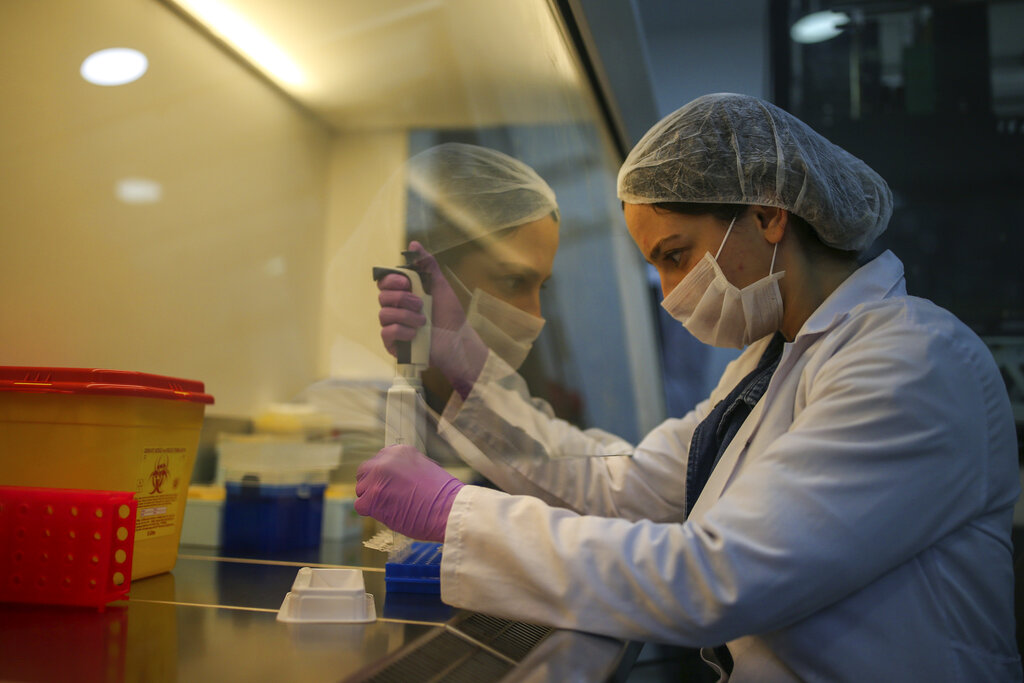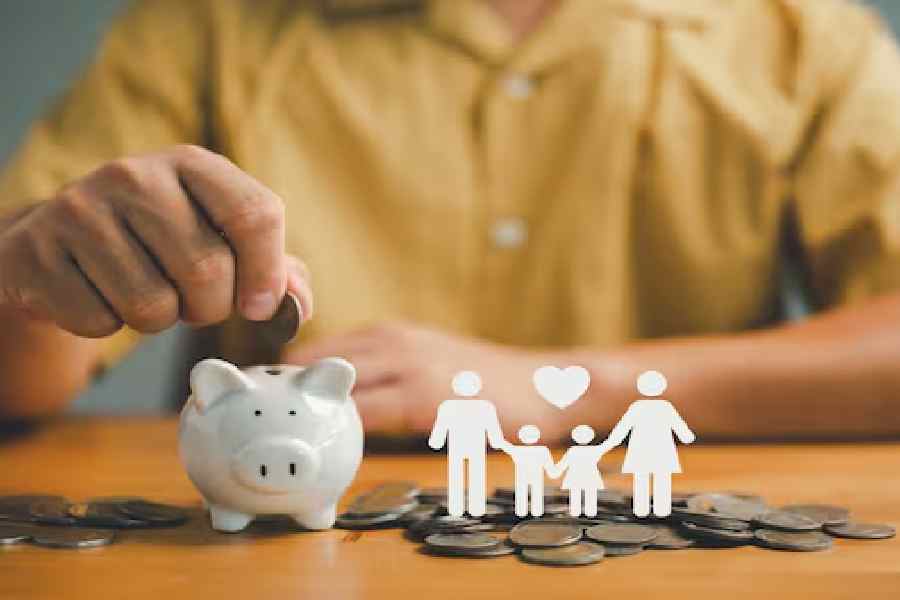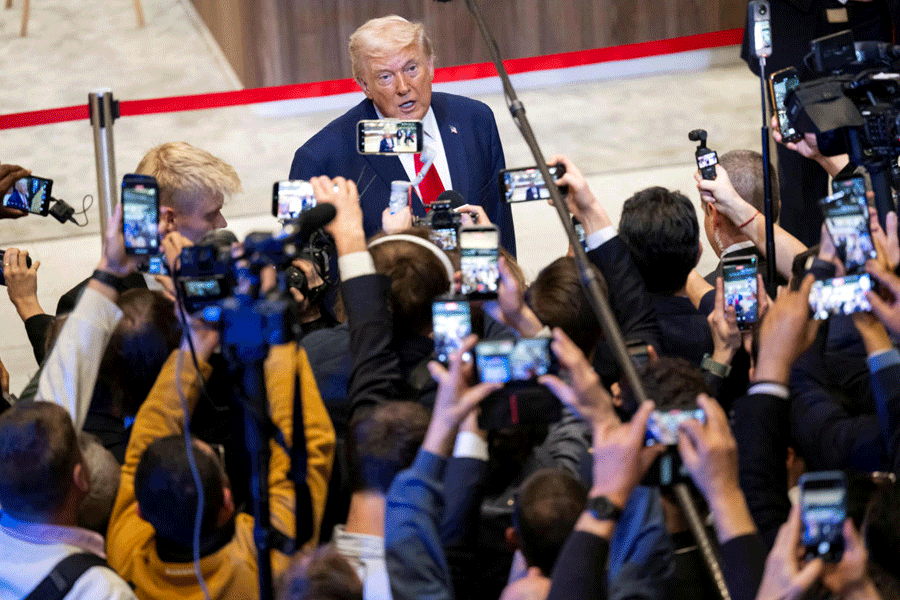Myth 13: A deadlier strain of the novel coronavirus has appeared
All viruses accumulate mutations over time and the virus that causes Covid-19 is no different. How widespread different strains of a virus become depends on natural selection – the versions that can propagate quickest and replicate effectively in the body will be the most “successful”. This doesn’t necessarily mean most dangerous for people though, as viruses that kill people rapidly or make them so sick that they are incapacitated may be less likely to be transmitted.
Genetic analysis by Chinese scientists of 103 samples of the virus taken from patients in Wuhan and other cities, suggests that early on two main strains emerged, designated L and S. Although the L strain appeared to be more prevalent than the S strain (about 70% of the samples belonged to the former), the S branch of the virus was found to be the ancestral version.
The team behind this research suggested that this may indicate the L strain is more “aggressive”, either transmitting more easily or replicating faster inside the body. However, this theory is speculative at this stage – there haven’t yet been direct comparisons to see whether people who catch one version of the virus are more likely to pass it on or suffer more severe symptoms.
Myth 14: You can get the virus from products made in China
Scientists currently believe that the virus doesn't survive for extended periods on hard surfaces, although its lifespan is still being studied. A package from China will be in transit for several days or weeks before being delivered so it's unlikely that it harbours the virus, according to John Hopkins Medicine.
Myth 15: Consuming cow dung and cow urine can cure and prevent Covid-19
In some places and several cities in India cow dung and cow urine have been administered as antidotes, claiming that it boosts our immune system and kills the virus. There have been instances where cow urine has been sprinkled on areas and surfaces as a disinfectant.
Scientifically there is no basis to this. It hasn't been proven or determined that cow urine or cow dung can be used in any form either as a surface applicant or administered orally as a remedy.
16. Consuming chicken can cause Covid-19
What affects chicken called the Bird Flu or Avian flu. the novel coronavirus has nothing to do with birds. If the chicken is healthy and comes from a properly inspected farm, cleaned to ensure that they are disease free, it's reasonably safe to say that the consumption of well-cooked chicken/eggs does not lead to a Corona infection.
Myth 9: Eating garlic helps prevent infection with the new coronavirus
Garlic is a healthy food that may have some antimicrobial properties. However, there is no evidence from the current outbreak that eating garlic has protected people from the new coronavirus.
Myth 10: The new coronavirus affects older people
People of all ages can be infected by the new coronavirus (2019-nCoV). Older people, and people with pre-existing medical conditions (such as asthma, diabetes, heart disease) appear to be more vulnerable to becoming severely ill with the virus.
WHO advises people of all ages to take steps to protect themselves from the virus, for example by following good hand hygiene and good respiratory hygiene.
Myth 11: Anti-malarials are effective in treating Covid-19
Till date, there is no specific medicine recommended to prevent or treat the new coronavirus (2019-nCoV). However, recently conducted trials have shown that chloroquine may aid in speedy recovery of Covid-19 patients. Both chloroquine and hydroxychloroquine are cheap, off-patent anti-malarials. Studies suggest that antimalarial drugs prevent the virus from invading cells and replicating. Besides shortening the illness, researchers believe the drugs might help stop people getting infected in the first place.
Myth 12: Wearing face masks protects you from contracting Covid-19
Wearing a face mask is certainly not an iron-clad guarantee that you won’t get sick – viruses can also transmit through the eyes and tiny viral particles, known as aerosols, can penetrate masks. However, masks are effective at capturing droplets, which is a main transmission route of coronavirus, and some studies have estimated a roughly fivefold protection versus no barrier alone (although others have found lower levels of effectiveness).
According to WHO:
- If you are healthy, you only need to wear a mask if you are taking care of a person with suspected 2019-nCoV infection.
- Wear a mask if you are coughing or sneezing.
- Masks are effective only when used in combination with frequent hand-cleaning with alcohol-based hand rubs or soap and water.
- If you wear a mask, then you must know how to use it and dispose of it properly.
- Before putting on a mask, clean hands with alcohol-based hand rub or soap and water.
- Cover mouth and nose with the mask and make sure there are no gaps between your face and the mask.
- Avoid touching the mask while using it; if you do, clean your hands with alcohol-based hand rubs or soap and water.
- Replace the mask with a new one as soon as it is damp and do not reuse single-use masks.
- To remove the mask: remove it from behind (do not touch the front of mask); discard immediately in a closed bin; clean hands with alcohol-based hand rubs or soap and water.
WHO approved guidelines for prevention
The best way to protect yourself against COVID-19 is by frequently cleaning your hands. By doing this you eliminate viruses that may be on your hands and avoid infection that could occur by then touching your eyes, mouth, and nose. In addition, maintaining social distancing is also of utmost importance because – at least 1 metre (3 feet) distance between yourself and anyone who is coughing or sneezing – when someone coughs or sneezes they spray small liquid droplets from their nose or mouth which may contain viruses. If you are too close, you can breathe in the droplets, including the COVID-19 virus if the person coughing has the disease
WHO also advises against touching your eyes, nose and mouth frequently. Hands touch many surfaces and can pick up viruses. Once contaminated, hands can transfer the virus to your eyes, nose or mouth. From there, the virus can enter your body and can make you sick. It also urges people to practice respiratory hygiene. This means covering your mouth and nose with your bent elbow or tissue when you cough or sneeze. Then dispose of the used tissue immediately.
Apart from these, if you have a fever, cough and difficulty in breathing, seek medical care early and follow the directions of your local health authority. Staying at home if you feel unwell is extremely important – you not only have a responsibility towards your own well being, but also of others.
Myth 5: Ultraviolet disinfection lamps kill the new coronavirus
UV lamps should not be used to sterilize hands or other areas of skin as UV radiation can cause skin irritation.
Myth 6: Spraying alcohol or chlorine all over your body may kill the new coronavirus
No. Spraying alcohol or chlorine all over your body will not kill viruses that have already entered your body. Spraying such substances can be harmful to clothes or mucous membranes (i.e. eyes, mouth). Be aware that both alcohol and chlorine can be useful to disinfect surfaces, but they need to be used under appropriate recommendations.
Myth 7: Vaccines against pneumonia can protect you against the new coronavirus
No. Vaccines against pneumonia, such as pneumococcal vaccine and Haemophilus influenza type B (Hib) vaccine, do not provide protection against the new coronavirus. The virus is so new and different that it needs its own vaccine. Researchers are trying to develop a vaccine against 2019-nCoV, and WHO is supporting their efforts. Although these vaccines are not effective against 2019-nCoV, vaccination against respiratory illnesses is highly recommended to protect your health.
Myth 8: Regularly rinsing your nose with saline help prevents infection with the new coronavirus
No. There is no evidence that regularly rinsing the nose with saline has protected people from infection with the new coronavirus.
There is some limited evidence that regularly rinsing nose with saline can help people recover more quickly from the common cold. However, regularly rinsing the nose has not been shown to prevent respiratory infections.
The coronavirus (Covid-19) outbreak has now spread in about 190 countries and territories, killing more than 19,000, and infecting more than 4,00,000 people globally. In India, over 500 people have contracted the disease and the country has been put on a 21-day lockdown, announced by prime minister Narendra Modi on Tuesday night. While social distancing, self isolation, and certain personal hygiene measures have been advocated by the World Health Organisation (WHO) as being the most effective in preventing the spread of the disease, the internet and social media is rife with a host of propagated myths and fake news.
From eating garlic to make the virus descended into the stomach where gut acids kill it, to outrageous consumption of cow urine to cure and make people immune to the disease, misinformation has added to global confusion and panic. The widespread trepidation over the virus has also forced large scale hoarding of masks, sanitisers, tissue paper in several countries, creating a shortage of essentials as people fear the worst.
Governments across the world are urging people to not panic-hoard essentials and food items, along with giving in to, and disseminating unproven, unverified information regarding the new virus and the disease. Hence, in these times of distress, it becomes more incumbent upon us to strictly adhere to scientific facts and reason. Here are a few myths and unreliable pieces of information regarding the spread, prevention, and cure of the disease.
Myth 1: The novel coronavirus cannot be transmitted in areas with hot and humid climates
From the evidence so far, the COVID-19 virus can be transmitted in ALL AREAS, including areas with hot and humid weather. Regardless of climate, protective measures should be adopted if you live in, or travel to an area reporting COVID-19.
Myth 2: Extreme cold weather and snow may kill the new coronavirus
There is no reason to believe that cold weather can kill the new coronavirus or other diseases. The normal human body temperature remains around 36.5°C to 37°C, regardless of the external temperature or weather.
Myth 3: Taking a hot bath may prevent the new coronavirus disease
Taking a hot bath will not prevent you from catching Covid-19. Your normal body temperature remains around 36.5°C to 37°C, regardless of the temperature of your bath or shower. Actually, taking a hot bath with extremely hot water can be harmful, as it can burn you.
Myth 4: Mosquitoes can spread the new coronavirus
To date there has been no information or evidence to suggest that the new coronavirus could be transmitted by mosquitoes. The new coronavirus is a respiratory virus which spreads primarily through droplets generated when an infected person coughs or sneezes, or through droplets of saliva or discharge from the nose.
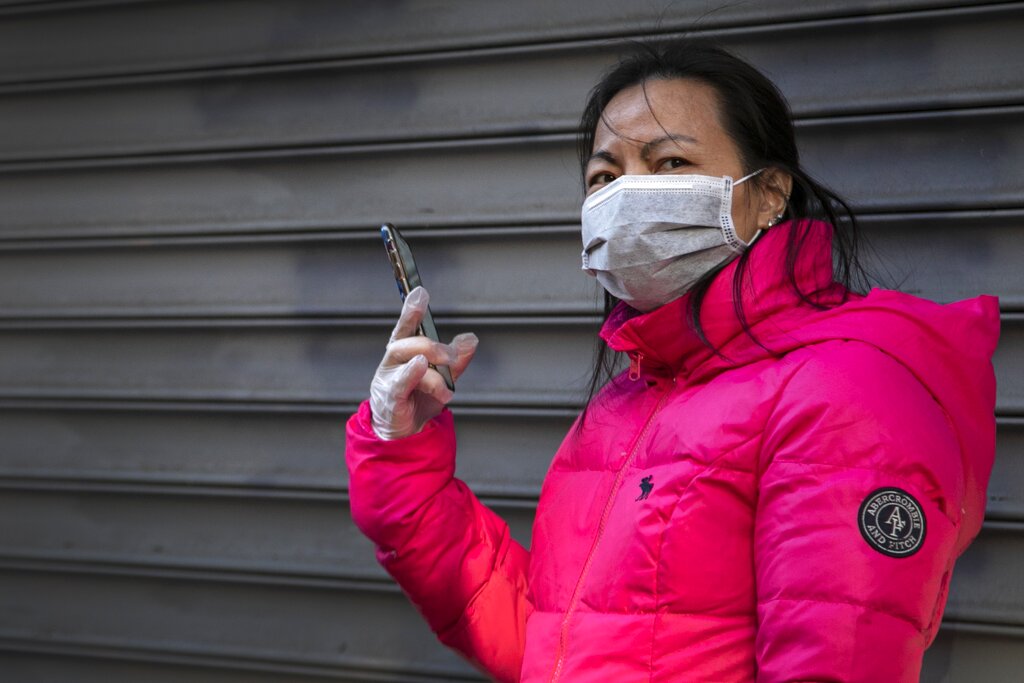
A woman wears surgical gloves and a face mask as she speaks on her smart phone in Chinatown on Sunday, March 15, 2020, in New York. (AP Photo/Wong Maye-E)
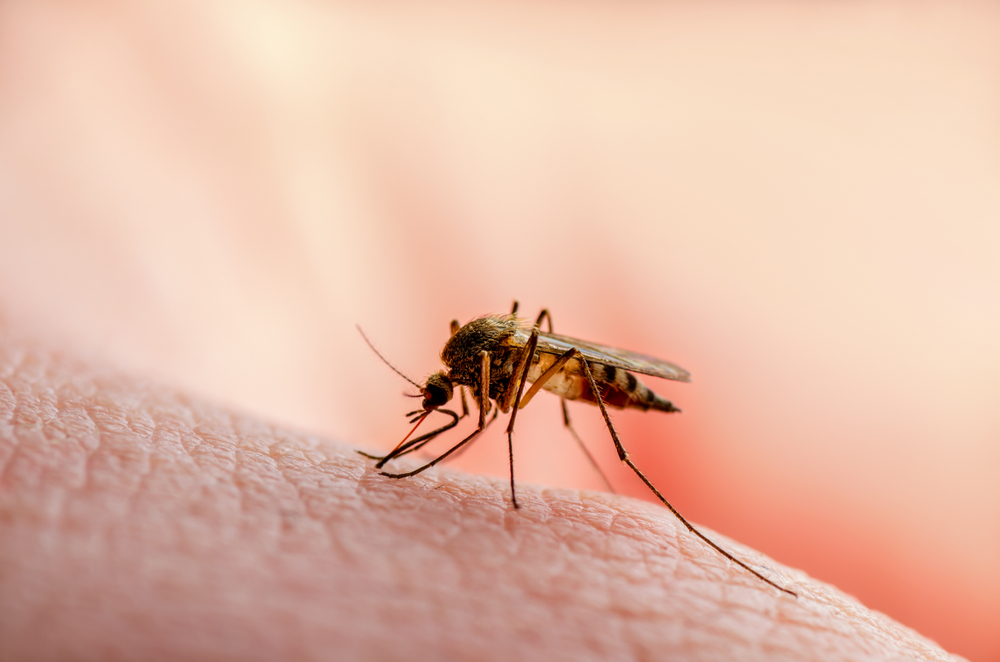
The new coronavirus is a respiratory virus which spreads primarily through droplets generated when an infected person coughs or sneezes, or through droplets of saliva or discharge from the nose, and not through mosquitoes. Shutterstock
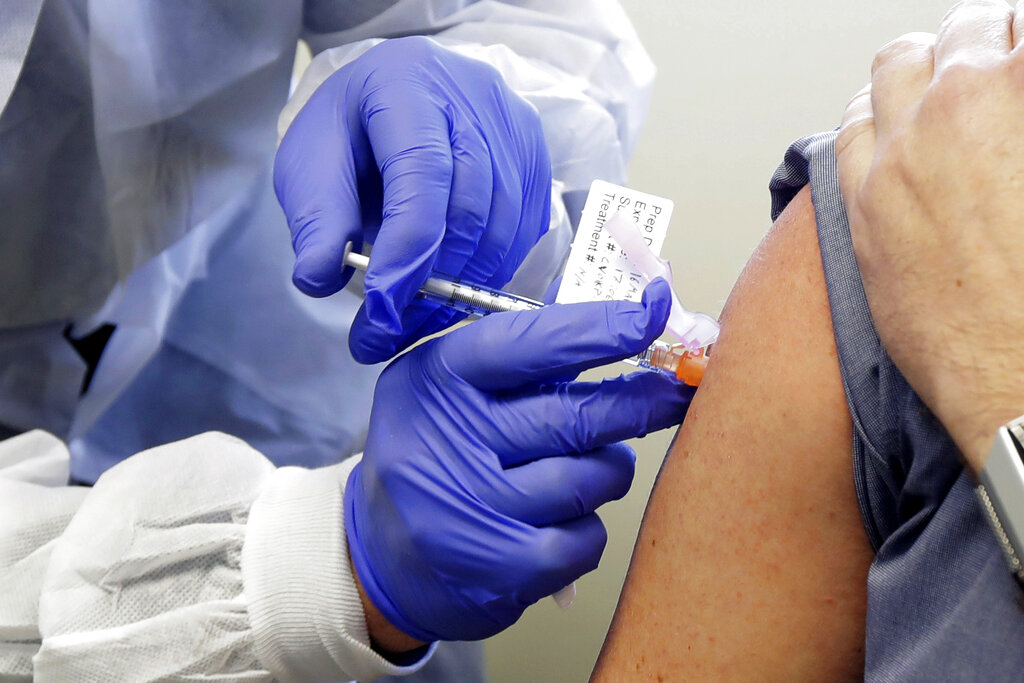
In this Monday, March 16, 2020 file photo, a patient receives a shot in the first-stage study of a potential vaccine for COVID-19, the disease caused by the new coronavirus, at the Kaiser Permanente Washington Health Research Institute in Seattle. (AP Photo/Ted S. Warren)
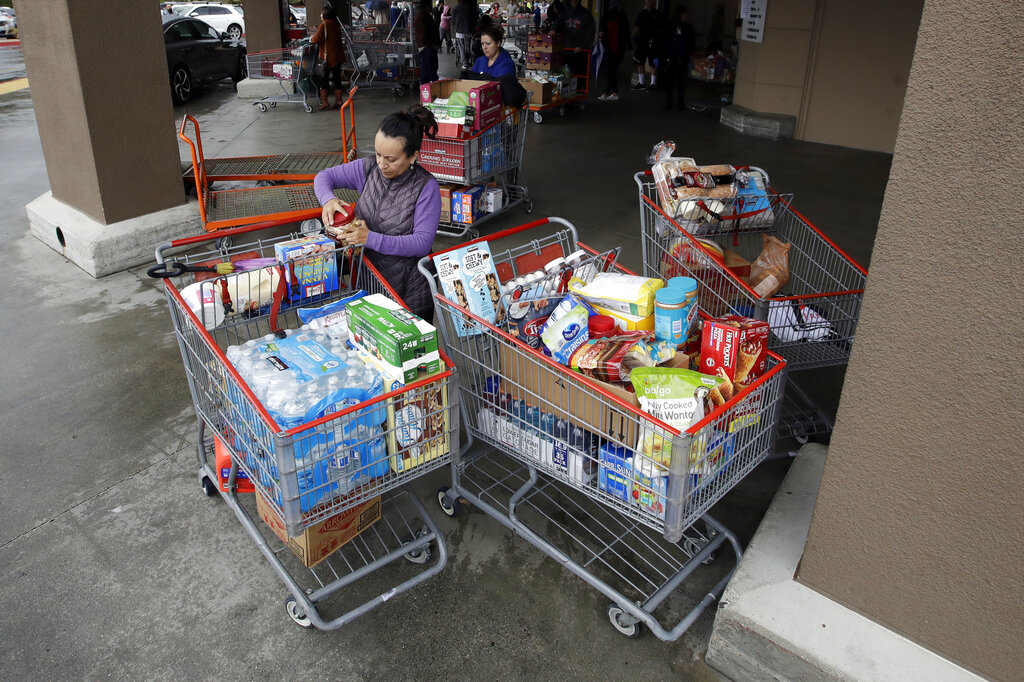
Shoppers exit a Costco warehouse with carts full of goods Saturday, March 14, 2020, in Santa Clarita, Calif. (AP Photo/Marcio Jose Sanchez)
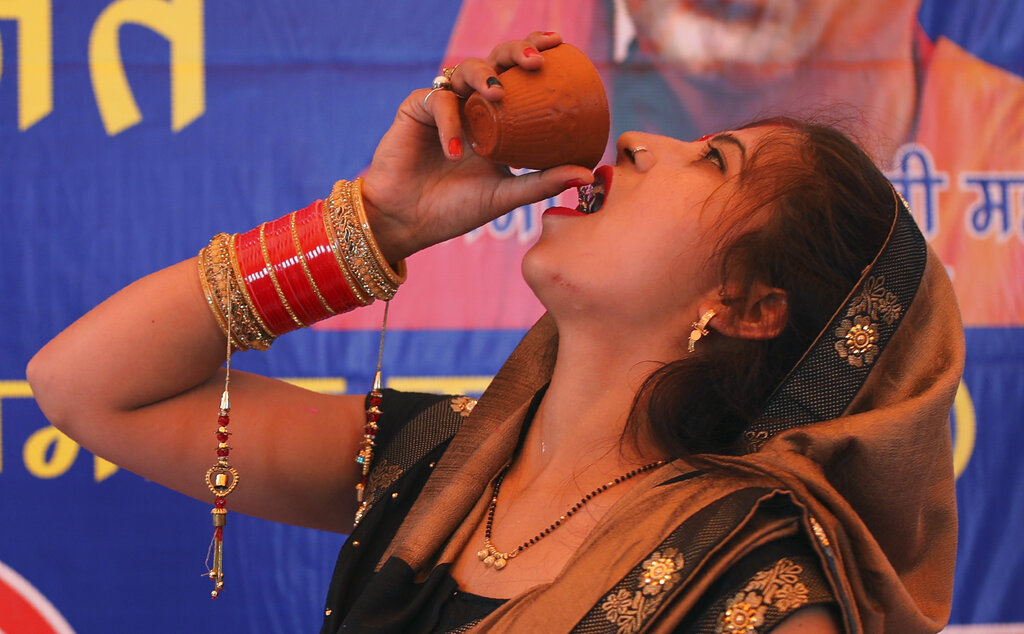
An Indian Hindu woman drinks cow urine during an event organized by a Hindu religious group to promote consumption of cow urine as a cure for the new coronavirus in New Delhi, India, Saturday, March 14, 2020. (AP Photo/Altaf Qadri)

